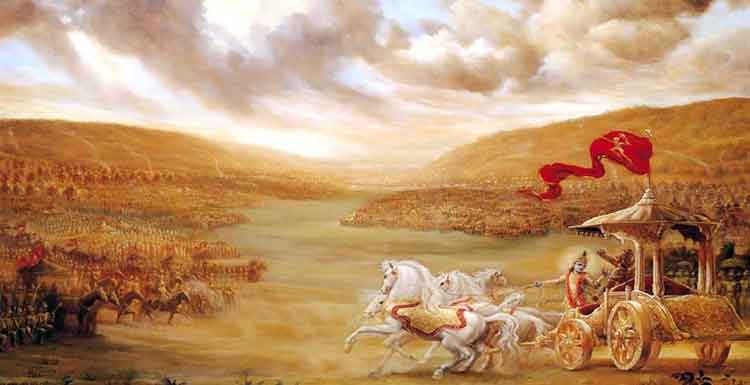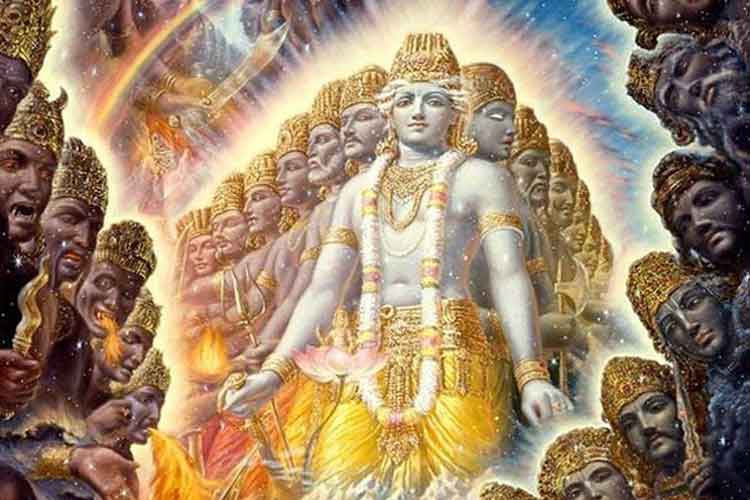Table of Contents
Life Management Lessons from Bhagavad Gita
According to Hindu beliefs, the Bhagavad Gita has given the solution to all the problems of life, such as any dilemma in the mind, any difficulty in making a decision, or business management. Although this legendary book is hundreds of years old, even today it is being used to gain the correct knowledge of success in life.
Bhagavad Gita is considered supreme among Hindus, it solves every problem that people face every other day. In this way, if you study Bhagavad Gita Quotes, your every problem will be solved. Along with this, you can also get the mantra to make your business successful from this Gita.
In the Bhagavad Gita, Lord Shri Krishna through Arjuna tells about how man should live his life. In this way, today we are going to tell you about some important verses of Bhagavad Gita, which teach us the art of life management. Let us know what is said in the Bhagavad Gita, which you can follow to reach the heights of success.
Shloka 1: Life Management Lessons from Bhagavad Gita
यद्यदाचरति श्रेष्ठस्तत्तदेवेतरो जन:।
स यत्प्रमाणं कुरुते लोकस्तदनुवर्तते।।
Yadidacharati Shresthastattadevetaro Janaha.
Sa Yatpramanam Kurute Lokastadnuvarttay..
Meaning: A noble man should always behave sweetly. Because more people are holding your business.
Management Sutra: A person who occupies a major position. He should act according to the dignity of his position. Because what a great man does, the common man adopts it as his ideal in his life.

Shloka 2: Life Management Lessons from Bhagavad Gita
त्रिविधं नरकस्येदं द्वारं नाशनमात्मनः।
कामः क्रोधस्तथा लोभस्तरमादेतत्त्रयं त्यजेत्।।Trividham Narakasyedam Dwaram Nashanmatmanaha.
Kamaha Krodhastatha Lobhastarmadetattrayam Tayjet..
Meaning: Work, anger and greed, these are the three gates of hell, which are the destroyers of the soul, i.e. the destroyers, so man should renounce these three.
Management Sutra: In human, work i.e. desires, anger and greed are the root causes of all evils. Lord Krishna said work, anger and greed are the gates of hell. Because a person who has these 3 evils inside, they are always engaged in fulfilling their selfishness by hurting others. So if you want to achieve any goal then you have to give up these three vices. Because as long as these evils remain in your mind, we will continue to stray from our goal.

Shloka 3: Life Management Lessons from Bhagavad Gita
नियतं कुरु कर्म त्वं कर्म ज्यायो ह्यकर्मण:।
शरीरयात्रापि च ते न प्रसिद्धयेदकर्मण।।
Niyatam Kuru Karma Tvam Karma Jayayo Haykarmanaha.
Shreeryatrapi Cha Te Na Parsiddhyedkarmana..
Meaning: Man should always act according to his religion.
Management Sutra: Lord Krishna wants to tell man through Arjuna that every man should act according to his religion. For example, a student’s religion is to acquire knowledge, a soldier’s karma is to protect the country, so a person should act according to his religion.

Shloka 4: Life Management Lessons from Bhagavad Gita
तानि सर्वाणि संयम्य युक्त आसीत मत्परः
वशे हि यस्येन्द्रियाणि तस्य प्रज्ञा प्रतिष्ठिता।।
Tani Sarvani Samyamya Yukta Aasit Matparaha.
Vashe Hi Yasyendriyani Tasya Prajna Pratishtha..
Meaning: Shri Krishna tells Arjuna that a man should subdue all his senses, because the intelligence of a man whose senses are subjugated is stable.
Management Sutra: Tongue, skin, eyes, ears, nose etc. Through which man enjoys all worldly pleasures. For example, the tongue is satisfied by tasting different tastes, the eyes are pleased by seeing a beautiful sight. Shri Krishna tells Arjuna that the person who controls his senses is the one whose intellect is stable. A person whose intelligence is stable reaches the heights in his field.

Shloka 5: Life Management Lessons from Bhagavad Gita
योगस्थ: कुरु कर्माणि संग त्यक्तवा धनंजय।
सिद्धय-सिद्धयो: समो भूत्वा समत्वं योग उच्यते।।
Yogasthaha Kuru Karmani Sang Tyaktva Dhananjaya.
Siddhaya-Siddhayoh Samo Bhutva Samatvam Yog Uchyate..
Meaning: While preaching to Arjuna, Krishna tells Arjuna that by giving up the urge not to do karma, by being Equanimeous in the matter of success and failure, by becoming yogic, doing karma, doing equanimity is called yoga.
Management Sutra: Religion really means duty, but we are often limited to rituals, worship, shrines in the name of religion. The scriptures of Hinduism call duty as religion. Lord Krishna tells Arjuna that one should never think about fame and disgrace and loss and gain in fulfilling one’s duty. Working by focusing the intellect only on your duty will give you better results and peace of mind which will make your yoga with God easier.

Shloka 6: Life Management Lessons from Bhagavad Gita
विहाय कामान् य: कर्वान्पुमांश्चरति निस्पृह:।
निर्ममो निरहंकार स शांतिमधिगच्छति।।
Vihay Kaamaan Yaha Karvanpumanscharati Nispruha.
Nirmamo Nirhamkar Sa Shantimdhigachhati..
Meaning: One who abandons all desires and egos within man and fulfils his duties is always happy.
Management Sutra: Lord Krishna is telling Arjuna that a man who has any kind of desire in his mind can never attain peace. To attain peace, man must erase desires from his mind. Whatever action we take, we stick our expected results with it. The desire for the consequences of our choices makes us vulnerable. By erasing the feelings of love or ego from the mind and performing one’s duties with concentration, one will attain peace.
If you want to be successful in your business, you must follow the things written in Shrimad Bhagavad Gita, so that you can reach your destination.

Shloka 7: Life Management Lessons from Bhagavad Gita
नास्ति बुद्धिरयुक्तस्य न चायुक्तस्य भावना।
न चाभावयत: शांतिरशांतस्य कुत: सुखम्।।
Nasti Budhiryuktsya Na Chayuktsya Bhavana.
Na Chabhavyataha Shantirshantasya Kutah Sukham..
Meaning: A man who is devoid of yoga does not have the wisdom to decide and does not have the spirit in his mind. An emotionless man like this will not get peace, and if he does not have peace, where will he get happiness?
Management Sutra: We all want to find happiness, we wander for it, but the root of happiness is in our mind. A man whose mind is involved in the senses, i.e. wealth, lust, laziness, etc., does not have Bhavana (self-knowledge). A man who does not have feelings in his mind never finds peace. Therefore, it is very important to have control of the mind to attain happiness.
